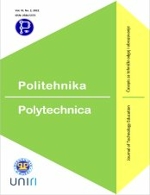Profili interesenata za studije Informatike u Hrvatskoj: slučaj riječkog sveučilišta
Profiles of applicants to study Informatics in Croatia: the case of the University of Rijeka
Author(s): Dino PitoskiSubject(s): Higher Education , State/Government and Education, ICT Information and Communications Technologies, Sociology of Education
Published by: Akademsko politehničko društvo APOLD Rijeka
Keywords: applicant profiles; profiles of the enrolled; study programmes in Informatics; geo-information-based demonstration;
Summary/Abstract: The sector of Information and Communication Technologies (ICT) is often promoted as the most prospective sector of an(y) economy, and ICT experts are an increasingly desired workforce, in Croatia as well as in the wider region. At the same time, in Croatia, ICT experts are a scarce workforce, and this problem becomes so vast that companies increasingly offer employment to persons that have not (yet) completed any kind of post-secondary education. In this article, the author analyses profiles of applicants and those students actually enrolled in the study programmes of Informatics at University of Rijeka, in the period of academic year 2012/2013 until academic year 2020/2021. The analysis is done with regards to the priority they give to these study programmes (whether these are their first, second or higher-order-rank choice), and with regards to their formerly attended high school study programmes from specific educational domains, with review of these same characteristics considering the students that actually were/are enrolled. The source data on applicants and the students enrolled, acquired by the University Board for the specified period, are extended by author using geo-informational attributes, for the purpose of creating comprehensive visualizations. Through the analysis of the development and current status of the interest for study programmes available at this large university in one of the largest Croatian urban centres, the author provides an insight into potentially generally valid circumstances in the educational sector as regards the education in the field of Informatics, and as regards the interest for specifically this type of education. The author's analysis provides the information to the Board of the University of Rijeka and the leaders of the educational system in Croatia for the purpose of planning, at the same time promoting, especially to scientists and policymakers, the innovative means of bringing closer the facts about the complex phenomena through geo-information-based demonstrations.
Journal: Politehnika: Časopis za tehnički odgoj I obrazovanje
- Issue Year: 6/2022
- Issue No: 2
- Page Range: 44-53
- Page Count: 10
- Language: Croatian

